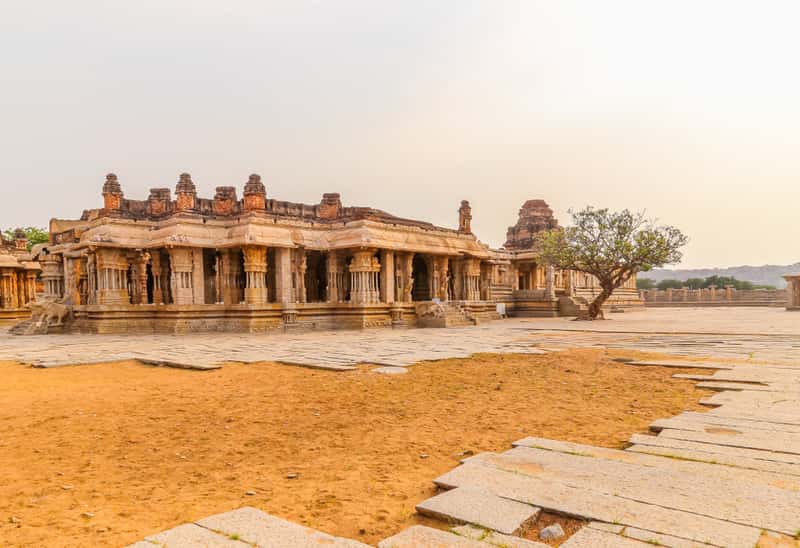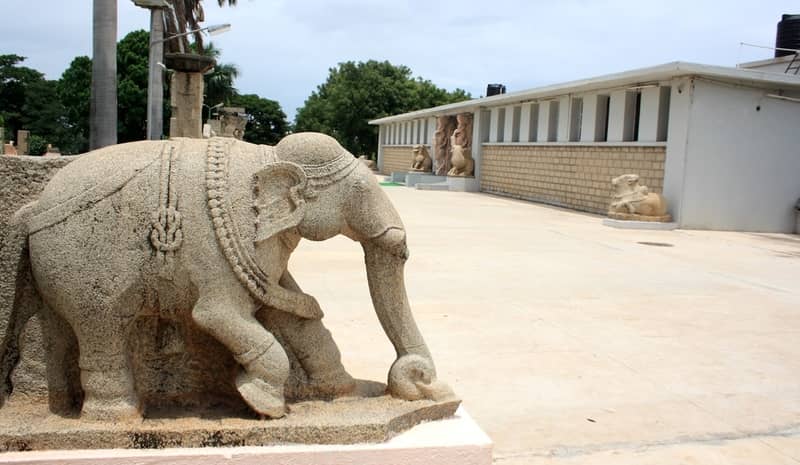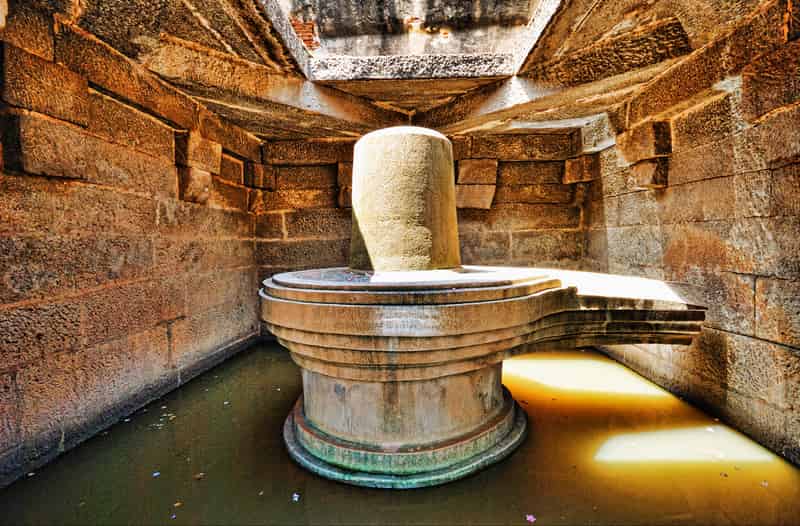Hampi, the benchmark in the historic places of the country, is not only a gem to the Indian sub-continent but a declared World Heritage Site by UNESCO too. The stature of the place is well backed with exceptional places to visit in Hampi.
A simple glance on any of it and you are sure intrigued with the lifestyle and the story behind it all. There are many must-visit places in this small city but the best of them have been handpicked and compiled in the list below. Treat the history buff in you to these exceptional tourist places of Hampi.
23 Intriguing Places to Visit in Hampi
1. Monkey Temple

Monkey Temple
Being in close association with Ramayana, the place is celebrated to be the birthplace of Lord Hanuman. Monkey temple is the spot of the birth of the Lord, which has now been converted into a temple and goes by the name the Hanuman temple. This temple is thronged on all sides with monkeys, but it sure does have one of the best views in the city.
- Timings: Dawn to Dusk
- Entry Fee: Free
2. Virupaksha Temple

Virupaksha Temple
This city is known to be the prime of Vijayanagar rulers and it is the Virupaksha Temple which has served to be the place to offer prayers since before that time. Estimated to be built around the 7th Century, this temple is devoted to Lord Virupaksha. An architectural marvel too, this temple is among the famous Hampi tourist places.
- Timings: 6 am to 6 pm
- Entry Fee: INR 5 for Indians and USD 5 for Foreign Nationals
3. Vijaya Vittala Temple

Vijaya Vittala Temple
Built in the 15th Century the Vijaya Vittala Temple is apparently the biggest structure in all of Hampi. The huge pillars, magnanimous temple halls, exceptional sculptures and the astounding stone chariot are the source of the mysticism that the temple portrays.
- Timings: 8:30 am to 5:30 pm
- Entry Fee: INR 10 for Indians and USD 5 for Foreign Nationals
4. Queen’s Bath

Queen’s Bath
An aide to understanding the rich culture of India, the Queen’s bath is the place that portrays the royalty of it all. The intricate carvings even on the bathing area of the time speak of how rich the kingdoms that have ruled the place were. The beauty of this enclosure is worth witnessing.
- Timings: 6 am to 6 pm
- Entry Fee: Free
5. Riverside Ruins

Riverside Ruins
A photographer’s delight, the Riverside Ruins of Hampi are an enticing tourist place which also serves to be prayer house for Lord Vishnu and Lord Shiva. The most astounding feature of the site is the 108 shivlingas carved in a single rock. Hiring a guide when at the place can help you truly understand the beauty of it all.
- Timings: 6 am to 6 pm
- Entry Fee: INR 30 per person
6. Hampi Bazaar

Hampi Bazaar
By the Foothills of Matanga Hill, the bazaar of Hampi is yet another place that can be visited but not for its architectural brilliance or rich history but for its sheer vividness. Full of bustling crowds and vendors, the end of this Bazaar too has the touch of history with a huge Bull statue on one end of the Bazaar.
- Timings: 6 am to 11 pm
- Entry Fee: Free
7. Matanga Hill

Matanga Hill
Such ruins when viewed panoramically are bound to be exceptionally beautiful and to see such a view, the Matanga hill is the place. A simple trek of about 30minutes takes you to the highest point of the hill. This point has to be the most extraordinary places to witness a sunrise in the town of Hampi.
- Timings: Dawn to Dusk
- Entry Fee: Free
8. Archeological Museum

Archeological Museum (source)
With a place as rich in historical treasures as Hampi the Archeological Museum has to be one of the most exquisite and most informative sites, and so it is. Having a wide variety of antiques and artifacts this place is divided into four sections. A complete historic delight for kids, this place is a must visit in Hampi.
- Timings: 10 am to 5 pm
- Entry Fee: INR 5 per person
9. Laxmi Narasimha Temple

Laxmi Narasimha Temple
Hampi houses many monolith statues but the biggest of them all is that of Lord Narasimha and is nestled in the Laxmi Narasimha Temple. Built in the year 1528, this temple was bought for ruins in the year 1565. The deity of the temple is an incarnation of Lord Vishnu with the body half of a man and half of a lion.
- Timings: 6 am to 6 pm
- Entry Fee: Free
10. Sasivekalu Ganesha Temple

Sasivekalu Ganesha Temple
This temple was built as an ode to Lord Ganesh. The statue of the deity of the temple is that of Lord Ganesh with a snake tied around his belly. As old as the year 1506, this temple is a good place to visit in Hampi.
- Timings: 6 am to 6 pm
- Entry Fee: Free
11. Hemakuta Hill Temple Complex

Hemakuta Hill Temple Complex
Having not one but several Hindu temples in its premises, the Hemakuta Hill Temple Complex now lays in ruins. With its tarnished walls and the broken pathways, the place adorns a charm hard to resist.
- Timings: Sunrise to sunset
- Entry Fee: Free
12. Tungabhadra Dam

Tungabhadra Dam
Among the famous places to see in Hampi, the Tungabhadra Dam is a collection to natural wonders. Having a flourishing garden on one side, this dam is frequented by Flamingos, which increase the charm of the place. Further, the beautiful landscape proves to be a photographer’s canvas.
- Timings: 8:30 am to 6:30 pm
- Entry Fee: Free
13. Daroji Bear Sanctuary

Daroji Bear Sanctuary
Rich in Sloth Bears, the Daroji Bear Sanctuary proves to be a good break from the wide collections of historic ruins. This forested sanctuary can help you witness bears in their natural habitat, strolling about the place. Also, housing leopards, hyenas, spotted deer and jackals, this place is a treat for kids.
- Timings: 6 am to 6 pm
- Entry Fee: INR 50 for Indian and INR 300 for Foreign Nationals
14. Underground Temple

Underground Temple
Oldest among these ancient temples of Hampi, the Underground Temple was constructed as a prayer house to Lord Shiva. On the outside, the temple is embellished with gardens, whereas the interiors of the temple are reached after climbing down a series of stairs. Remaining underwater for the most part of the year, this temple is among the less crowded delights of Hampi.
- Timings: 6 am to 6 pm
- Entry Fee: Free
15. Gagan Mahal

Gagan Mahal
One of the most beautiful monuments of Hampi, the yellow colored fort, Gagan Mahal is the place that boasts of its architectural brilliance through its intricately decorated windows and towers. A guide at the place can sure pique your interest in this 16th century Marvel.
- Timings: 8 am to 6 pm
- Entry Fee: Free
16. Krishna Temple

Krishna Temple
Another Temple dedicated to another god of the Indian Mythology; the Krishna Temple was built in the year 1513. This temple housed a figure of Balakrishna, but the same was moved to the Chennai State Museum. Now what remains is the architectural marvel of the time displaying interesting things to keep its guests entertained.
- Timings: 5;30 am to 1 pm, 5:30 pm to 9 pm
- Entry Fee: Free

Mahanavami Dibba (source)
Within the royal enclosure of Hampi, Mahanavami Dibba is a stone platform from the Vijayanagara period. Through ruined now with time, this place still has some exceptional carvings from the 16th century.
- Timings: 6 am to 6 pm
- Entry Fee: Free
18. Monolith Bull

Monolith Bull
Placed on a high platform, the monolith Bull here symbolizes the ride of Lord Shiva. Though partially ruined, this Monolithic Statue of the bull still is quite an attraction in Hampi owing to it magnanimous size. The devotees of Lord Shiva throng the place in huge numbers.
- Timings: 7 am to 8 pm
- Entry Fee: Free
19. Zenana Enclosure

Zenana Enclosure
This place holds such special importance primarily for the fact that this was the private quarters for the royal women and their friends. The palace in itself was the biggest excavation in all of Hampi and this section for the queen is one of the most mystic sections of the palace.
- Timings: 8 am to 6 pm
- Entry Fee: INR 10 for Indians and INR 250 for Foreign Nationals
20. Elephant Stables

Elephant Stables
Elephants the royal rides in the time of the Vijayanagara Empire were treated as royalty too. As proof to this statement, the astounding Elephant stables of Hampi stand tall till date. The chambers were basically eleven domed structures, among which one intricately decorated enclosure was used by musicians for performances.
- Timings: 8:30am to 5:30pm
- Entry Fee: INR 10 for Indians and INR 220 for Foreign Nationals
21. Big Shivalinga

Big Shivalinga (source)
One of the major tourist spots in Hampi, the big Shivalinga is the symbol of Lord Shiva. The unique feature of this Shivalinga is that even in spite of its magnanimous size, this structure was carved out of a single boulder. As tall as 3 meters, this Shivalinga now stands amidst water in the sanctum of the temple.
- Timings: 5 am to 9 pm
- Entry Fee: Free
22. Hazara Rama Temple

Hazara Rama Temple
The temple for the Royals, the Hazara Rama Temple boasts of intricate carvings. These carvings are basically depicting the Gods and Goddesses of the time. Dating back to the 15th Century, this temple has already been featured in many Bollywood and Kannada films for its beauty.
- Location:
- Timings: 6 am to 6 pm
- Entry Fee: Free
23. Hippie Island

Hippie Island
Through it is the southern section of the Tungabhadra dam that receives the major footfall, owing to the impeccable ruins that the place prides in, but the northern banks of the river have some good tourist spots. Among these, the Hippie Island on the river is a major attraction. This little island has a number of cafes and shacks which prove the perfect antidote to stress.
- Location: Tungabhadra Dam
- Timings: Accessible any time except Monsoon season
- Entry fee: Free
The places mentioned above must have your interests in Hampi piqued. Make a visit to these places and truly understand the magic of Hampi.
Do share your experiences with us when you make a visit to the place, or if you have been to historic jackpot already, we are all ears for recommendations and suggestions from your end too.













